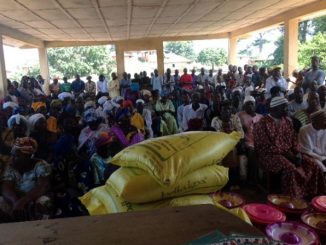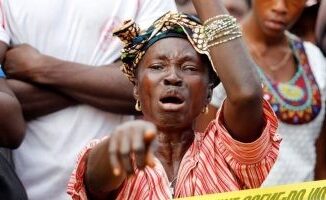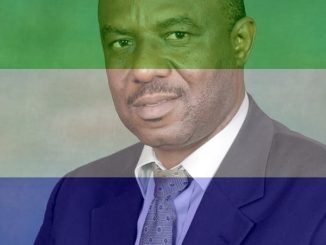
By Chernoh Alpha M. Bah and Matthew Anderson
Leaked diplomatic correspondences seen by the Africanist Press reveal a growing rift between members of the diplomatic community and the government of President Bio, including an apparent refusal by multilateral and foreign officials in the country to meet with President Julius Maada Bio about escalating violence in the country prior to his now infamous “Terrorism Statement” after its controversial content was leaked to the diplomatic community.
Diplomatic officials in Sierra Leone are expressing serious concerns over what they describe as “the rising spate of violence across Sierra Leone over the last two weeks, including reports of the mass killing of an unknown number of unarmed inmates at the Freetown Male Correctional Center, coupled with the increased nature of police brutality amidst a state of emergency declared by the country’s president, Julius Maada Bio in the wake of COVID 19.” Even prior to the prison massacre, the growing isolation of the Bio administration and its crackdown on civil liberties was apparent when US Ambassador to Sierra Leone, Maria E. Brewer published an unprecedented op-ed in the country’s major newspapers, calling for political leaders “to accept criticism and responsibility with humility, grace and compassion,” in the wake of the Corona pandemic. The op-ed also noted, although without direct reference to President Bio, that “Officials who choose to protect their power and pride rather than the health and welfare of their people place their own people’s health and future at risk.”

The latest escalation of diplomatic concerns comes in the wake of the president’s May 8 speech, in which he described recent, and by all accounts spontaneous, youth protests across the country, as well as the April 29 prison incident, as “acts of domestic terrorism” carried out by opposition elements sponsored by leaders of the All Peoples Congress (APC), the party of former president Ernest Bai Koroma. In the speech, Bio accused the APC of “inciting, planning, financing, mobilizing, and in some cases actively participating” in “carefully planned, coordinated, well-orchestrated and executed acts of violent terrorism,” despite offering no evidence to substantiate such serious accusations.
The president’s speech was delivered just hours after the proposed State House meeting between foreign diplomats and the president was boycotted by foreign embassies and diplomats despite a note verbale (a diplomatic correspondence) from the country’s foreign ministry addressed to members of the diplomatic community, including representatives of the EU, the IMF and World Bank announcing the presidential invitation. Embassy dispatches on the situation in Sierra Leone seen by the Africanist Press illustrate an overwhelming consensus that the diplomatic boycott underlines foreign embassies disapproval of the Bio government’s lack of sincere commitment to address political hostilities emanating from his party and the APC.
Indeed, Africanist Press has also exclusively uncovered that foreign diplomats and agency officials in the country appear to have declined the invitation to meet with Bio prior to the speech after the speech’s inciteful content was leaked to the diplomatic community out of concerns that the speech minimized the government’s role in the violence, and its contents were likely to inflame, rather than ease, tensions. According to recent diplomatic leaks and interviews with a number of sources, foreign and UN officials have expressed concern that the “heightened nature of political tensions between ruling party officials and the country’s main opposition party have been worsened by the government’s unwillingness to foster an atmosphere of cohesion and tolerance.” Foreign diplomats are blaming the acrimonious political environment on the Sierra Leone government’s “failure to timely adjudicate lingering political cases and the seeming lack of an independent redress mechanism to resolve enduring animosities and legal controversies arising from the 2018 elections and from subsequent by-elections conducted over the last two years.”

A leading foreign embassy official further confirmed to Africanist Press that senior diplomats in Sierra Leone are expressing collective concerns “over the worrisome nature of the recent incidents of violence especially at the Freetown Male Correctional Center where the death toll still remains unknown.” Diplomats interviewed have expressed concern and bewilderment at the mass killing of unarmed inmates and the wanton destruction of property that accompanied the violent incidents in the prison. “The widespread police brutality and violence that accompanied the declaration of a state of emergency in Sierra Leone with the advent of the Coronavirus pandemic are issues of great concern to us,” a senior embassy staff member told Africanist Press.
A statement issued on May 1 by the UN’s Resident Coordinator in response to the prison incident reminded the government of Sierra Leone of its obligations under international conventions and treatise to respect the human rights of all persons deprived of their liberty. The UN called for “prompt and full investigations into the incidents so that perpetrators of the violence may be brought to justice.” Despite announcing an ongoing investigation into the prison incident, the president, and his deputy internal affairs minister appointed to supervise the investigation, have already concluded that the prison incident was orchestrated by “domestic terrorists” operating on behalf of the APC. Several APC politicians, including two former ministers in the past government of Koroma, have been recently arrested and are continually detained on allegations of treason and related criminal charges. One of the detainees, Alfred Paolo Conteh, a former defense and internal affairs minister, was arrested under controversial circumstances following his visit to State House on invitation of the president to discuss the country’s COVID 19 response preparations.

Diplomatic sources indicate that a high-powered foreign embassy delegation that earlier met with officials in the president’s office to discuss the circumstances surrounding Conteh’s arrest left unconvinced about the merits of the government’s case against him. Since the end of preliminary hearings at a Freetown magistrate court and the committal of proceedings to the high court, Conteh’s case and the three other individuals, charged along with him, is yet to be slated for a hearing. Following the prison incident, lawyers representing APC detainees have complained of lack of access to their clients. Citing Coronavirus emergency regulations, the country’s chief justice earlier suspended all court hearings following an alleged positive COVID case in the prison reportedly brought by a new anonymous pre-trial detainee. Following requests from Bio, the chief justice has suddenly lifted his intial ban on court proceedings, announcing new dates for trials of political detainees whom the president already named in the recent incidents of violence. Many in the diplomatic community are becoming concerned that the state of emergency and its attendant lockdown measures in the wake of the coronavirus pandemic offer the government an unchecked latitude in the exercise of political authority, and are concerned that the emergency regulations are being used by the country’s president to settle political scores that will only worsen deep rooted rivalries and open old wounds from the country’s decade-long civil war that lasted from 1991-2002.
However, foreign ministry officials in Freetown have denied reports that the diplomatic community declined the president’s invitation because of their disapproval of his speech. Florence Bangalie, director general of foreign affairs told the Africanist Press that the scheduled meeting was not convened by the foreign ministry but by officials at State House. She said the meeting could not be held due to the coronavirus pandemic. She claims that a virtual meeting is likely expected to happen in the future in place of an in-person meeting to abide by social distancing rules already in force in the country. Africanist Press could not reach the minister of foreign affairs and her deputy for further clarifications as repeated phone calls to both officials went unanswered.




